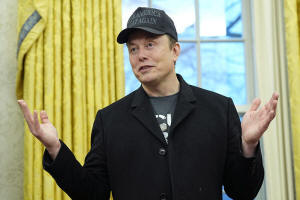DOGE trumpets unemployment fraud that the government already found years
ago
[April 16, 2025]
By MATT SEDENSKY
NEW YORK (AP) — The latest government waste touted by billionaire Elon
Musk's cost-cutting Department of Government Efficiency is hundreds of
millions of dollars in fraudulent unemployment claims it purportedly
uncovered.
One problem: Federal investigators already found what appears to be the
same fraud, years earlier and on a far greater scale.
In a post last week on X, the social media site Musk owns, DOGE
announced “an initial survey of unemployment insurance claims since
2020” found 24,500 people over the age of 115 had claimed $59 million in
benefits; 28,000 people between the ages of 1 and 5 collected $254
million; and 9,700 people with birthdates more than 15 years in the
future garnered $69 million from the government.
The tweet drew a predictable party-line reaction of either skepticism or
cheers, including from Musk himself, who said what his team found was
“so crazy” he re-read it several times before it sank in.
“Another incredible discovery,” marveled Labor Secretary Lori Chavez-DeRemer,
who repeated DOGE’s findings to President Donald Trump in a Cabinet
meeting last week.
Chavez-DeRemer’s recounting of the alleged fraud, including claims of
benefits filed by unborn children, drew laughter in the Cabinet room and
a reaction from Trump himself.
“Those numbers are really bad,” he said.

But Chavez-DeRemer needn't look further than her own department’s Office
of the Inspector General to find such fraud had already been reported by
the type of federal workers DOGE has demonized.
“They’re trying to spin this narrative of, ‘Oh, government is
inefficient and government is stupid and they’re catching these things
that the government didn’t catch,’” says Michele Evermore, who worked on
unemployment issues at the U.S. Department of Labor during the
administration of former President Joe Biden. “They’re finding fraud
that was marked as fraud and saying they found out it was fraud.”
The Social Security Act of 1935 enshrined unemployment benefits in
federal law but left it to individual states to set up systems to
collect unemployment taxes, process applications and mete out support.
Though states have almost complete control over their own unemployment
systems, special relief programs — most notably widely expanded benefits
enacted by the first Trump administration at the outset of the COVID
pandemic — inject more direct federal involvement and a flood of new
beneficiaries into the system.
In regular times, state unemployment systems perform “very well, not so
well and terribly,” according to Stephen Wandner, an economist at the
National Academy of Social Insurance who authored the book “Unemployment
Insurance Reform: Fixing a Broken System.” With COVID slamming the
economy and creating a flood of new claims that states couldn’t handle,
Wandner says many more were “quite terrible.”
Trump signed the COVID unemployment relief into law on March 27, 2020,
and from the very start it became a magnet for fraud. In a memo to state
officials about two weeks later, the Department of Labor warned that the
expanded benefits had made unemployment programs “a target for fraud
with significant numbers of imposter claims being filed with stolen or
synthetic identities.”
That same memo offered an option for states trying to protect a person
whose identity was stolen to fraudulently collect unemployment benefits.
To preserve a record of the fraud but keep innocent people from being
linked to it, states could create a “pseudo claim,” the memo advises.
[to top of second column]
|

Elon Musk speaks during an event with President Donald Trump in the
Oval Office at the White House, Feb. 11, 2025, in Washington. (AP
Photo/Alex Brandon, File)

Those “pseudo claims” led to records of toddlers and centenarians
getting checks. The Labor Department's inspector general tallied
some 4,895 unemployment claims from people over the age of 100
between March 2020 and April 2022, but another departmental memo
explained that the filings stemmed from states changing dates of
birth to protect people whose identities were used.
“Many of the claims identified ... were not payments to individuals
over 100 years of age, but rather ‘pseudo records’ of previously
identified fraudulent claims,” the 2023 memo says.
A Labor Department spokeswoman did not respond to questions about
Musk's findings and DOGE gave no details on how it came to find the
supposed fraud or whether it duplicates what was already found.
Though DOGE ostensibly looked at longer timeframe than federal
investigators previously had, it tallied just $382 million in fake
unemployment claims, a tiny fraction of what investigators were
already aware.
In 2022, the Labor Department said suspected COVID-era unemployment
fraud totaled more than $45 billion. The Government Accountability
Office later said it was far worse, likely $100 billion to $135
billion.
“I don't think it's news to anyone,” says Amy Traub, an expert on
unemployment at the National Employment Law Project. “It's been
widely reported. There've been multiple congressional hearings.”
If DOGE's newest allegations have an air of familiarity, it's
because they echo its prior findings of about Social Security
payments to the dead and the unbelievably old. Those were false
claims.
That makes DOGE an imperfect messenger even when fraud has occurred,
as with unemployment claims.
Jessica Reidl, a senior fellow at the conservative think tank The
Manhattan Institute, is a fiscal conservative who so champions
rooting out federal waste she has written 600 articles on the
subject. Though she believes unemployment insurance fraud is rife,
she has trouble accepting any findings from DOGE, which she says has
acted ineffectively and possibly illegally.

“When DOGE says impossibly old dead people are collecting
unemployment in huge numbers, I become skeptical,” Reidl says. “DOGE
does not have a good track record in that area.”
Traub said the burst of pandemic-era unemployment fraud led states
to implement new security measures. She questioned why Musk’s team
was trumpeting old fraud as if it’s new.
“Business leaders and economists are warning about a national
recession, so it’s natural to think about unemployment,” says Traub.
“It’s an attack on the image of a critically important program and
perhaps an attempt to undermine public support on unemployment
insurance when it couldn’t be more important.”
All contents © copyright 2025 Associated Press. All rights reserved
 |